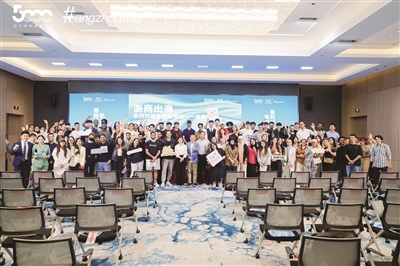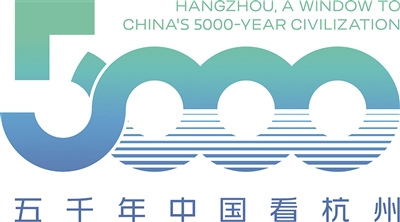
Photo provided to Hangzhoufeel

Event
By Jin Yingying
On Apr 16, Hangzhoufeel hosted a unique dialogue between Moroccan students and one of China’s leading multinational companies, Hailiang Group.
Themed around globalization and talent empowerment, the event brought together nearly 100 Moroccan students from five universities in Hangzhou, serving as Gen Z City Experience Officers. They explored how international talent can act as a cultural and developmental bridge for Chinese companies expanding abroad--particularly into Africa.
Hailiang Group, a Fortune Global 500 enterprise, is expanding its global footprint with a bold step into Morocco, where it plans to establish a zero-carbon industrial park powered entirely by renewable energy and utilizing 100% recycled copper. During the visit, students toured various exhibition halls showcasing the group’s technological innovations, social responsibility programs, and its transformation from a local copper tube manufacturer to a global leader in low-carbon solutions.
In the corporate culture hall, students learned about the company’s core values emphasizing harmony and integrity. In another exhibition area, they explored Hailiang’s large-scale copper foil production project in Indonesia and its ambitious vision for Morocco. Abdelkarim Soussane, a software engineering student at Hangzhou Dianzi University, said, “This visit deepened my interest in Hailiang. The scale of their international projects is inspiring.”
Meanwhile, Malak Ghazal, a nursing major from Hangzhou Normal University, reflected on how Hailiang’s smart education platforms could benefit under-resourced schools in rural Morocco. “If technology like this were introduced in Africa, it could change the lives of so many children,” she said.
The event also featured three formal invitations from Hailiang to Moroccan students. Yao Hui, Vice Secretary of the Party Committee of the company, emphasized its long-term commitment to inclusive global growth. “We’re not just building factories--we’re creating innovation hubs,” she noted. Shao Guoyong, Director of Strategic Development, revealed that the Moroccan industrial park will require 750 local hires, telling students, “You could be the first generation of ‘Moroccan Hailiang people.’”
Discussions highlighted Morocco’s strategic position as a gateway to both Europe and Africa. Zhejiang think tank expert Professor Yang Yiqing explained that Morocco’s Tangier Med Port connects to 77 countries and has free trade agreements covering a market of 800 million people. “Seven hundred years ago, Moroccan explorer Ibn Battuta once described Hangzhou as ‘heaven on earth.’ Now, Zhejiang entrepreneurs are returning to Morocco with high-tech industry,” he said, connecting past and present.
Students actively engaged in an open forum, discussing career development, cross-cultural challenges, and the future of Chinese-Moroccan cooperation. Abdelkarim, who speaks Chinese, Arabic, English, and French, emphasized the importance of mutual understanding: “If companies listen to local voices and invest in international talent, it’s a win-win.”
In closing remarks, students proposed ways to enhance the “sweet potato economy”--a metaphor representing Hailiang’s global expansion strategy. They called for language training, localized management strategies, and joint education programs in green energy. Nachti Hafsa from Zhejiang University of Science and Technology suggested establishing university collaborations to train a new generation of Moroccan talent capable of advancing both technological development and cultural exchange.